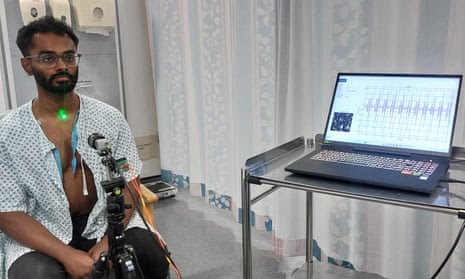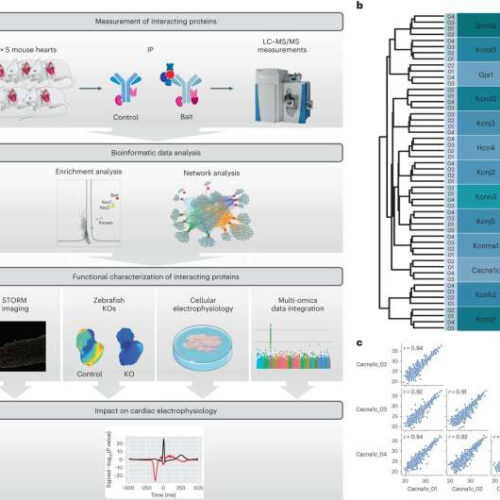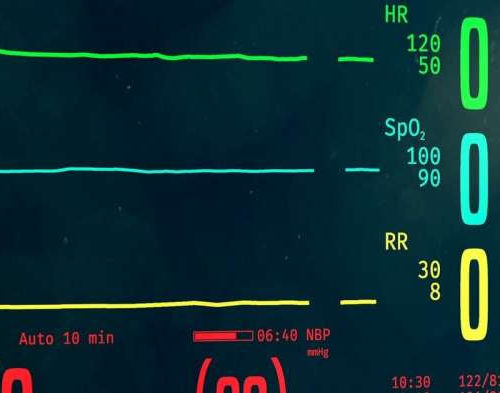September 19, 2024 by Schweizerischer Nationalfonds SNF Main effect of awareness on event-related potential amplitudes. Credit: Proceedings of the National Academy of Sciences (2024). DOI: 10.1073/pnas.2311953121A new study from the University of Fribourg highlights previously unknown links between the body and the brain. The findings of this research show how our bodily rhythms affect our...
Tag: <span>heartbeat</span>
AI laser that reads heartbeat through the throat could replace stethoscopes
New invention, which can be set up at home, promises to transform the way we monitor our health, say scientistsRobin McKie A patient being monitored at the Queen Elizabeth university hospital in Glasgow. Scientists have used AI to develop a laser camera that can measure heartbeats away from hospitals and GP surgeries. Scientists have developed...
Researchers find heartbeat relies on surprisingly large network of proteins
by University of Copenhagen MS evaluation of cardiac ion channel IPs. a, Workflow of the study. We performed MS measurements of immunoprecipitated channels and their interactors and of control IPs from quadruplicate murine cardiac tissue lysates. Deep proteome measurements of the membrane-enriched mouse heart samples utilized in the IP experiments were also performed. Bioinformatics network analyses...
Air pollution exposure associated with increased risk of irregular heartbeat
by Canadian Medical Association Journal Credit: Unsplash/CC0 Public Domain Does air pollution affect your heart? Acute exposure to air pollution was found to be associated with an increased risk of arrythmia—irregular heartbeat—in a large study of 322 Chinese cities published in CMAJ (Canadian Medical Association Journal). The common arrhythmia conditions atrial fibrillation and atrial flutter, which can progress...
Coffee won’t upset your heartbeat, and might even calm it
by Dennis Thompson For decades, doctors have warned folks suffering from heart rhythm problems to avoid coffee, out of concern that a caffeine jolt might prompt a herky-jerky heartbeat. But a large new study has found that most people can enjoy their morning joe or afternoon diet cola free from worry—caffeine doesn’t seem to increase most...
When is ‘dead’ really dead? What happens after a person ‘flatlines’
by Amanda Van Beinum and Sonny Dhanani, The Conversation New research shows that heart activity may not always end with a flatlined monitor. Credit: Shutterstock How long should doctors wait after a “flatline” appears before they can declare a person dead? How can they be sure that heartbeat and circulation will not return? The most common way...
STUFF ( quercertin) IN CAPERS ACTIVATES KEY PROTEINS IN BRAIN AND HEART
A compound common in pickled capers, quercetin, activates proteins required for normal human brain and heart activity, researchers report. In a new study in Communications Biology, the researchers report that quercetin can directly regulate proteins required for bodily processes such as the heartbeat, thought, muscular contraction, and normal functioning of the thyroid, pancreas, and gastrointestinal...
Intensive blood pressure control has potential to reduce risk of atrial fibrillation
by Wake Forest University Baptist Medical Center Intensive blood pressure control may reduce the risk of atrial fibrillation (AFib), an irregular heartbeat that can lead to serious complications such as stroke, heart failure and heart attacks, according to scientists at Wake Forest School of Medicine. In a study published in the May 4 edition of...
Burnout linked with irregular heartbeat
by European Society of Cardiology Feeling excessively tired, devoid of energy, demoralised, and irritable? You may have burnout, a syndrome associated with a potentially deadly heart rhythm disturbance. That’s the conclusion of a large study published today in the European Journal of Preventive Cardiology, a journal of the European Society of Cardiology (ESC). “Vital exhaustion,...
Taller people have increased risk for developing atrial fibrillation
Penn Medicine study shows height is a causal risk factor for AFib UNIVERSITY OF PENNSYLVANIA SCHOOL OF MEDICINE PHILADELPHIA — Taller people have an increased risk of developing atrial fibrillation (AFib), an irregular and often rapid heartbeat that can lead to stroke, heart failure and other complications, according to a new Penn Medicine study. The...
- 1
- 2







